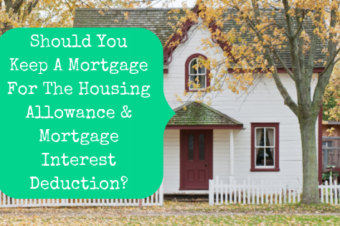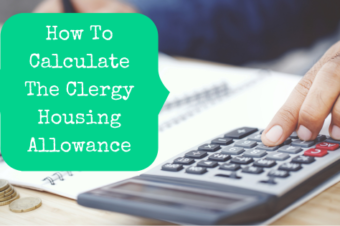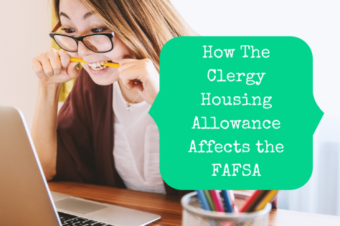
Airbnb is a great way to earn extra income. However, renting out part of your home affects your ability to take the ministerial housing allowance.
Last week we heard from guest writer Stephanie Anderson about how she and her husband are supplementing his pastoral income by renting out part of their home through Airbnb. Airbnb takes advantage of technology and our modern sharing economy to create a viable way for pastors everywhere to earn extra income.
However, there is one thing that pastors need to take into consideration when hosting through Airbnb that others don’t have to; the ministerial housing allowance. Pastors have the unique opportunity to exclude the cost of their housing from their gross income for federal income tax purposes.
But what happens if their house is more than just a home and is generating income for them, as through Airbnb? What effect does that have on their ability to take the pastoral housing allowance?
The Ministerial Housing Allowance Cannot Cover Business Property
Section 1.107-1(c) of the Internal Revenue Code clearly states,
“Where the minister rents, purchases, or owns a farm or other business property in addition to a home, the portion of the rental allowance expended in connection with the farm or business property shall not be excluded from his gross income.”
That means that if you’re making money off of it as a business, then you can’t exclude it from your gross income as part of a housing allowance. Thus, if you have a home and a rental property you can take a pastoral housing allowance for the home but not the rental property.
With Airbnb, though, your home and rental are often the same property. That makes it a little bit harder to separate the two. However, if you want to claim a ministerial housing allowance and do so legally, you have to separate the two.
How To Calculate A Ministerial Housing Allowance When You Rent Part Of Your Home
Let’s say you own a 2,000 square-foot home. You’ve turned the 400 square-foot basement mother-in-law suite into an Airbnb rental. What counts towards your housing allowance and what is a business expense?
The easy answer is that anything you use for the rental must be excluded from your housing allowance. There are some things that are easy to separate between your personal use and rental use, such as furniture. What about utilities like electricity and things like cleaning supplies and toilet paper, though?
We can use the rules that the IRS has set out for calculating home office expenses as a guide. First, you need to list out your home expenses. Then, calculate the percentage of each that can be attributed to your Airbnb rental. For this example, 400 out of 2,000 square-feet is 20% of your home being used for business purposes. Here’s what it might look like:
| Total Cost Per Month | Personal Use | Airbnb | |
| Mortgage/Rent | $1,600 | $1,280 | $320 |
| Home Maintenance | $200 | $160 | $40 |
| Furniture/Decor (Home) | $85 | $85 | |
| Furniture/Decor (Rental Unit) | $20 | $20 | |
| Internet & Cable | $100 | $80 | $20 |
| Utilities (Gas, electricity, water, trash) | $250 | $200 | $50 |
| Household Supplies | $120 | $96 | $24 |
| Total | $2,375 | $1,901 | $474 |
So, you cannot take the full $2,375 of your monthly expenses as a housing allowance because some of that you are using for business purposes, to earn an income. You can only take $1,901. The other $474 are your business expenses and do not qualify towards your housing allowance.
While renting out part of your home through Airbnb can be a great way to earn extra money, it also complicates your ministerial housing allowance (and taxes in general). You should make sure to work with a tax professional that has experience with ministerial issues when preparing your taxes, just to make sure that you’re doing everything legally.




2 Responses
Marie Kualono
March 9, 2023I love your blog. It’s so helpful. But I have a question about this.
Our home has a section that we rent to guests when our kids are away in college. But we only rent for 30 days or more due to our state laws; so to travel nurses or remote workers. This seems to be called passive income and reportable on Schedule E, if I’m not mistaken.
In this case, can we still not take housing allowance for the whole home?
Amy
April 9, 2023You can take a housing allowance, just not for the part of the home that is generating an income. For example, if the part you rent out represents 20% of your home, you can still claim 80% of your mortgage payments, utilities, etc.